2 Nov 2018 from 3-6 pm
Peter Wall Institute for Advanced Studies, 6331 Crescent Road, UBC
Symposium: Collective Acts
-
Marilyn Dumont
SpeakerMarilyn Dumont is of Cree-Métis descent. She holds a BA (University of Alberta) and an MFA (University of British Columbia) and is currently an Associate Professor of Native Studies at University of Alberta. Her work has been widely anthologized and broadcast on radio and television. . Since 1985, she has published in numerous Canadian literary journals, and her work has been widely anthologized, as well as broadcast on radio and television. Her first collection of poems—A Really Good Brown Girl—won the 1997 Gerald Lampert Memorial Award from the League of Canadian Poets. Dumont has taught at Simon Fraser University and Kwantlen University College in Vancouver and has been writer-in-residence at the universities of Alberta, Brandon, Toronto (Massey College), and Windsor, as well as Grant MacEwan College in Edmonton and the Edmonton Public Library. She has also taught at the Banff Centre and the Sage Hill Writing Experience and worked in video production as an intern with the National Film Board. (2018)
Read More
-
Candice Hopkins
SpeakerCandice Hopkins is a curator and writer originally from Whitehorse, Yukon and based in Albuquerque, New Mexico. She is co-curator of the forthcoming SITE Santa Fe biennial, Casa Tomada, 2018, as well as co-curator of the Canadian Pavilion at the 58th Venice Biennale opening May, 2019, which will feature the media work of Isuma Productions a collective based in Igloolik and Montreal, Canada. She was a curator for documenta 14 in Athens, Greece and Kassel, Germany. Her writing is published widely and recent essays include “Outlawed Social Life” for South as a State of Mind and “The Gilded Gaze: Wealth and Economies on the Colonial Frontier” for the documenta 14 Reader. She has lectured on contemporary art, sound, indigeneity, native economies, and vernacular architecture at such venues as Witte de With, WIELS, Tate Modern, Dak’Art Biennale, Artists Space, Tate Britain and the National Gallery of Canada. She is the recipient of the Hnatyshyn Foundation Award for Curatorial Excellence in Contemporary Art and the 2016 the Prix pour un essai critique sur l’art contemporain by the Foundation Prince Pierre de Monaco. Hopkins is a citizen of Carcross/Tagish First Nation. (2018)
Read More
-
Tarah Hogue
ModeratorTarah Hogue is a curator, writer and uninvited guest on xʷməθkʷəy̓əm (Musqueam), Skwxwu7mesh (Squamish), and səl̓ilwətaɁɬ (Tsleil-Waututh) territories/Vancouver, B.C. Of Métis and Dutch ancestry, Hogue was raised in Red Deer, A.B. on the border between Treaty 6 and 7 territories. Her work engages collaborative methodologies and attends to histories of place in order to decentre colonial modes of perception. She is the inaugural Senior Curatorial Fellow, Indigenous Art at the Vancouver Art Gallery where her exhibition, Ayumi Goto and Peter Morin: how do you carry the land? is on view through October 2018. She is also a Visiting Curator at the Institute of Modern Art in Brisbane for 2018 along with Sarah Biscarra Dilley, Freja Carmichael, Léuli Lunaʻi Eshraghi, and Lana Lopesi. She was curator-in-residence with grunt gallery between 2014–2017, the 2016 Audain Aboriginal Curatorial Fellow at the Art Gallery of Greater Victoria, and has curated exhibitions at the Morris and Helen Belkin Art Gallery, Or Gallery, and SFU Gallery. She is co-organizer of #callresponse with Maria Hupfield and Tania Willard, currently touring through 2019, and is the co-chair of the Aboriginal Curatorial Collective/Collectif des Commissaires Autochtones. Hogue has written texts for BlackFlash, Canadian Art, Decoy Magazine, Inuit Art Quarterly, and MICE Magazine. She holds a master’s degree in Critical and Curatorial Studies from the University of British Columbia.
Read More
-
Shelly Rosenblum
Shelly Rosenblum is Curator of Academic Programs at the Belkin. Inaugurating this position at the Belkin, Rosenblum’s role is to develop programs that increase myriad forms of civic and academic engagement at UBC, the wider Vancouver community and beyond. Rosenblum received her PhD at Brown University and has taught at Brown, Wesleyan and UBC. Her awards include fellowships from the Center for the Humanities, Wesleyan University and a multi-year Presidential Postdoctoral Research Fellowship, Department of English, UBC. She was selected for the Summer Leadership Institute of the Association of Academic Museums and Galleries at the Kellogg School of Management, Northwestern University (2014). Her research interests include issues in contemporary art and museum theory, discourses of the Black Atlantic, critical theory, narrative and performativity. Her teaching covers the 17th to the 21st centuries. She remains active in professional associations related to academic museums and cultural studies, attending international conferences and workshops, and recently completing two terms (six years) on the Board of Directors at the Western Front, Vancouver, including serving as Board President. At UBC, Rosenblum is an Affiliate of the Peter Wall Institute for Advanced Studies.
Read More
Please join us in conversation with Candice Hopkins and Marilyn Dumont in an event moderated by Tarah Hogue. As part of the exhibition Beginning with the Seventies: Collective Acts, the Belkin presents an afternoon symposium addressing key issues in feminism related to collective organizing, mobilization and individual resistance. How does attention to the archive affect everyday experience and acts of resistance to hegemonic inequality? Attending to struggles with racism, sexism, heterosexism, and other intersecting oppressions, this program will address the exhibition and the insistent responses of contemporary artistic practices.
Candice Hopkins is a curator and writer originally from Whitehorse, Yukon and based in Albuquerque, New Mexico. She is co-curator of the SITE Santa Fe biennial, Casa Tomada, 2018, as well as co-curator of the Canadian Pavilion at the 58th Venice Biennale opening May, 2019, which will feature the media work of Isuma Productions a collective based in Igloolik and Montreal, Canada. She was a curator for documenta 14 in Athens, Greece and Kassel, Germany. Her writing is published widely and recent essays include “Outlawed Social Life” for South as a State of Mind and “The Gilded Gaze: Wealth and Economies on the Colonial Frontier” for the documenta 14 Reader. She has lectured on contemporary art, sound, indigeneity, native economies, and vernacular architecture at such venues as Witte de With, WIELS, Tate Modern, Dak’Art Biennale, Artists Space, Tate Britain and the National Gallery of Canada. She is the recipient of the Hnatyshyn Foundation Award for Curatorial Excellence in Contemporary Art and the 2016 the Prix pour un essai critique sur l’art contemporain by the Foundation Prince Pierre de Monaco. Hopkins is a citizen of Carcross/Tagish First Nation.
Marilyn Dumont is of Cree-Métis descent. She holds a BA (University of Alberta) and an MFA (University of British Columbia) and is currently an Associate Professor of Native Studies at University of Alberta. Her work has been widely anthologized and broadcast on radio and television. Since 1985, she has published in numerous Canadian literary journals, and her work has been widely anthologized, as well as broadcast on radio and television. Her first collection of poems—A Really Good Brown Girl—won the 1997 Gerald Lampert Memorial Award from the League of Canadian Poets. Dumont has taught at Simon Fraser University and Kwantlen University College in Vancouver and has been writer-in-residence at the universities of Alberta, Brandon, Toronto (Massey College), and Windsor, as well as Grant MacEwan College in Edmonton and the Edmonton Public Library. She has also taught at the Banff Centre and the Sage Hill Writing Experience and worked in video production as an intern with the National Film Board.
Symposium Schedule
3pm – Introductions, Shelly Rosenblum and Tarah Hogue
3:10-3:50 – Presentation, Marilyn Dumont
3:50-4:30 – Presentation, Candice Hopkins
4:30-5:15 – Moderated Conversation and Audience participation
5:15-6pm – Reception
All are welcome. Admission is free.
The Gallery will remain open until 6 pm.
Image (above): Heather Kai Smith, Seeds of Peace, 2018. Courtesy of the artist.
Conceived and developed by Shelly Rosenblum.
-
Marilyn Dumont
SpeakerMarilyn Dumont is of Cree-Métis descent. She holds a BA (University of Alberta) and an MFA (University of British Columbia) and is currently an Associate Professor of Native Studies at University of Alberta. Her work has been widely anthologized and broadcast on radio and television. . Since 1985, she has published in numerous Canadian literary journals, and her work has been widely anthologized, as well as broadcast on radio and television. Her first collection of poems—A Really Good Brown Girl—won the 1997 Gerald Lampert Memorial Award from the League of Canadian Poets. Dumont has taught at Simon Fraser University and Kwantlen University College in Vancouver and has been writer-in-residence at the universities of Alberta, Brandon, Toronto (Massey College), and Windsor, as well as Grant MacEwan College in Edmonton and the Edmonton Public Library. She has also taught at the Banff Centre and the Sage Hill Writing Experience and worked in video production as an intern with the National Film Board. (2018)
Read More
-
Candice Hopkins
SpeakerCandice Hopkins is a curator and writer originally from Whitehorse, Yukon and based in Albuquerque, New Mexico. She is co-curator of the forthcoming SITE Santa Fe biennial, Casa Tomada, 2018, as well as co-curator of the Canadian Pavilion at the 58th Venice Biennale opening May, 2019, which will feature the media work of Isuma Productions a collective based in Igloolik and Montreal, Canada. She was a curator for documenta 14 in Athens, Greece and Kassel, Germany. Her writing is published widely and recent essays include “Outlawed Social Life” for South as a State of Mind and “The Gilded Gaze: Wealth and Economies on the Colonial Frontier” for the documenta 14 Reader. She has lectured on contemporary art, sound, indigeneity, native economies, and vernacular architecture at such venues as Witte de With, WIELS, Tate Modern, Dak’Art Biennale, Artists Space, Tate Britain and the National Gallery of Canada. She is the recipient of the Hnatyshyn Foundation Award for Curatorial Excellence in Contemporary Art and the 2016 the Prix pour un essai critique sur l’art contemporain by the Foundation Prince Pierre de Monaco. Hopkins is a citizen of Carcross/Tagish First Nation. (2018)
Read More
-
Tarah Hogue
ModeratorTarah Hogue is a curator, writer and uninvited guest on xʷməθkʷəy̓əm (Musqueam), Skwxwu7mesh (Squamish), and səl̓ilwətaɁɬ (Tsleil-Waututh) territories/Vancouver, B.C. Of Métis and Dutch ancestry, Hogue was raised in Red Deer, A.B. on the border between Treaty 6 and 7 territories. Her work engages collaborative methodologies and attends to histories of place in order to decentre colonial modes of perception. She is the inaugural Senior Curatorial Fellow, Indigenous Art at the Vancouver Art Gallery where her exhibition, Ayumi Goto and Peter Morin: how do you carry the land? is on view through October 2018. She is also a Visiting Curator at the Institute of Modern Art in Brisbane for 2018 along with Sarah Biscarra Dilley, Freja Carmichael, Léuli Lunaʻi Eshraghi, and Lana Lopesi. She was curator-in-residence with grunt gallery between 2014–2017, the 2016 Audain Aboriginal Curatorial Fellow at the Art Gallery of Greater Victoria, and has curated exhibitions at the Morris and Helen Belkin Art Gallery, Or Gallery, and SFU Gallery. She is co-organizer of #callresponse with Maria Hupfield and Tania Willard, currently touring through 2019, and is the co-chair of the Aboriginal Curatorial Collective/Collectif des Commissaires Autochtones. Hogue has written texts for BlackFlash, Canadian Art, Decoy Magazine, Inuit Art Quarterly, and MICE Magazine. She holds a master’s degree in Critical and Curatorial Studies from the University of British Columbia.
Read More
-
Shelly Rosenblum
Shelly Rosenblum is Curator of Academic Programs at the Belkin. Inaugurating this position at the Belkin, Rosenblum’s role is to develop programs that increase myriad forms of civic and academic engagement at UBC, the wider Vancouver community and beyond. Rosenblum received her PhD at Brown University and has taught at Brown, Wesleyan and UBC. Her awards include fellowships from the Center for the Humanities, Wesleyan University and a multi-year Presidential Postdoctoral Research Fellowship, Department of English, UBC. She was selected for the Summer Leadership Institute of the Association of Academic Museums and Galleries at the Kellogg School of Management, Northwestern University (2014). Her research interests include issues in contemporary art and museum theory, discourses of the Black Atlantic, critical theory, narrative and performativity. Her teaching covers the 17th to the 21st centuries. She remains active in professional associations related to academic museums and cultural studies, attending international conferences and workshops, and recently completing two terms (six years) on the Board of Directors at the Western Front, Vancouver, including serving as Board President. At UBC, Rosenblum is an Affiliate of the Peter Wall Institute for Advanced Studies.
Read More
Related
-
Exhibition
4 September 2018 – 2 December 2018
Beginning with the Seventies: Collective Acts
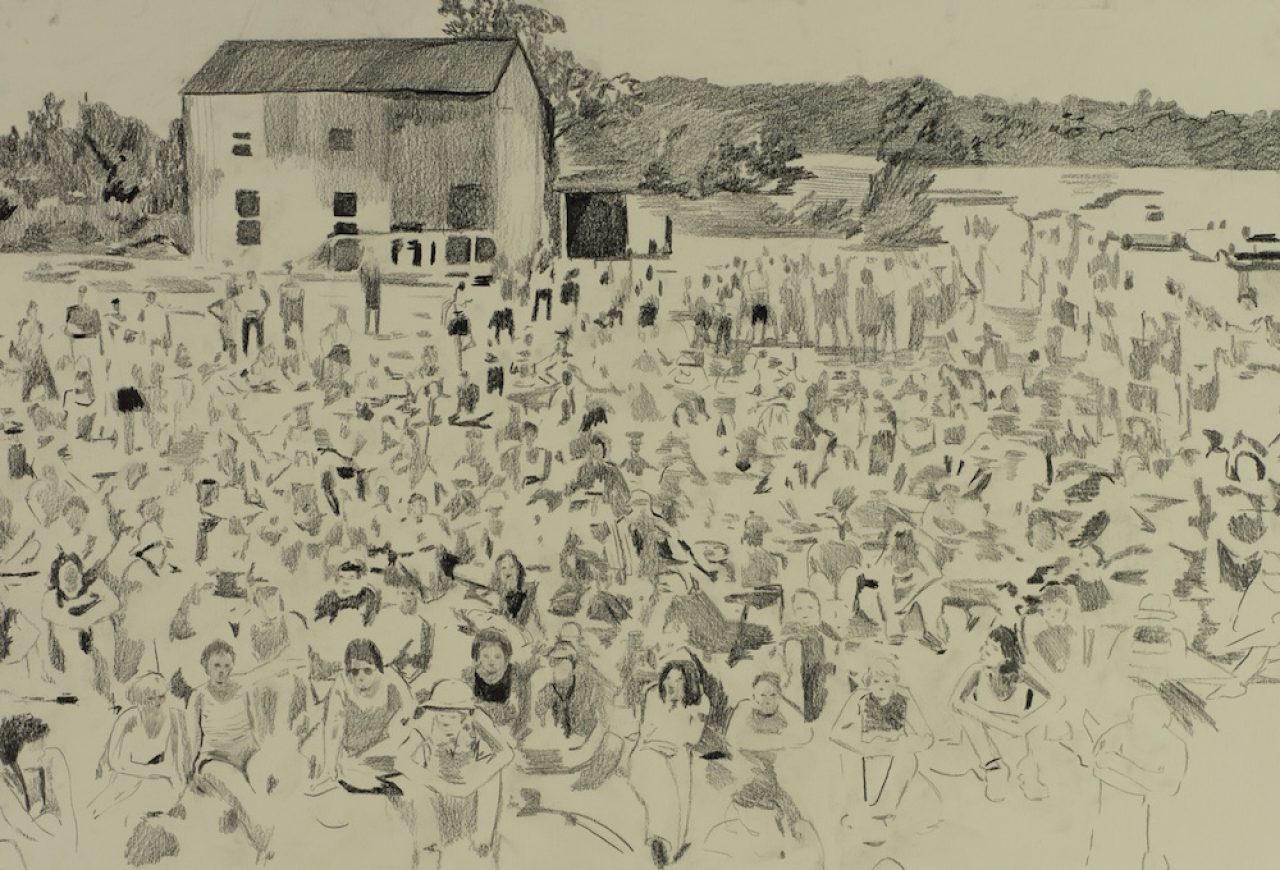
Collective Acts taps into the generative potential of archival research by artists into experiments with collective organizing and cooperative production, presenting new work by Dana Claxton, Jeneen Frei Njootli and the ReMatriate Collective, Christine D’Onofrio and Heather Kai Smith, alongside work by Salish Weavers Guild members Mary Peters, Adeline Lorenzetto and Annabel Stewart. Beginning with the Seventies: Collective Acts is curated by Lorna Brown and is the third of four exhibitions based upon the Belkin Art Gallery’s research project investigating the 1970s, an era when social movements of all kinds – feminism, environmentalism, LGBTQ rights, Indigenous rights, access to health services and housing – began to coalesce into models of self-organization that overlapped with the production of art and culture. Noting the resurgence of art practice involved with social activism and an increasing interest in the 1970s from younger producers, the Belkin has connected with diverse archives and activist networks to bring forward these histories, to commission new works of art and writing and to provide a space for discussion and debate.
[more] -
Event
Session 1: 25 Sep 2018, 7:00 pm - 9:00 pm
Session 2: 9 Oct 2018, 7:00 pm - 9:00 pm
Session 3: 6 Nov 2018, 7:00 pm - 9:00 pm
Session 4: 20 Nov 2018, 7:00 pm - 9:00 pm
Session 5: 22 Jan 2019, 7:00 pm - 9:00 pm
Reading Group: Judith Butler
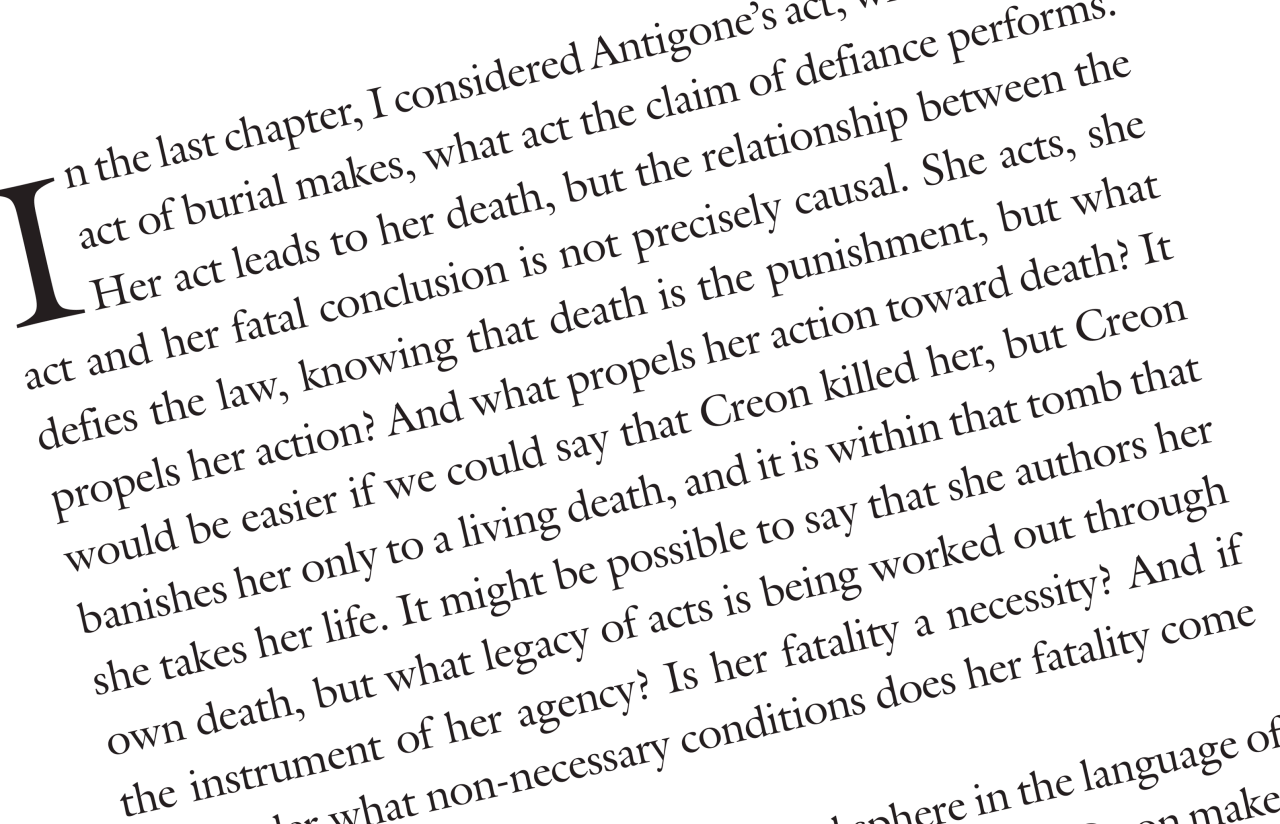
The Morris and Helen Belkin Art Gallery and the Institute for Gender, Race, Sexuality and Social Justice will host a study group on the work of Judith Butler at at Pollyanna 圖書館 Library, 221A. This six-session study group is convened in anticipation of her academic visit and public lecture at UBC in the Winter of 2019.
[more] -
Event
19 Oct - 21 Oct 2018, 1-4:00 pm. Three-day workshop.
Workshop: Ribbon Skirt Making
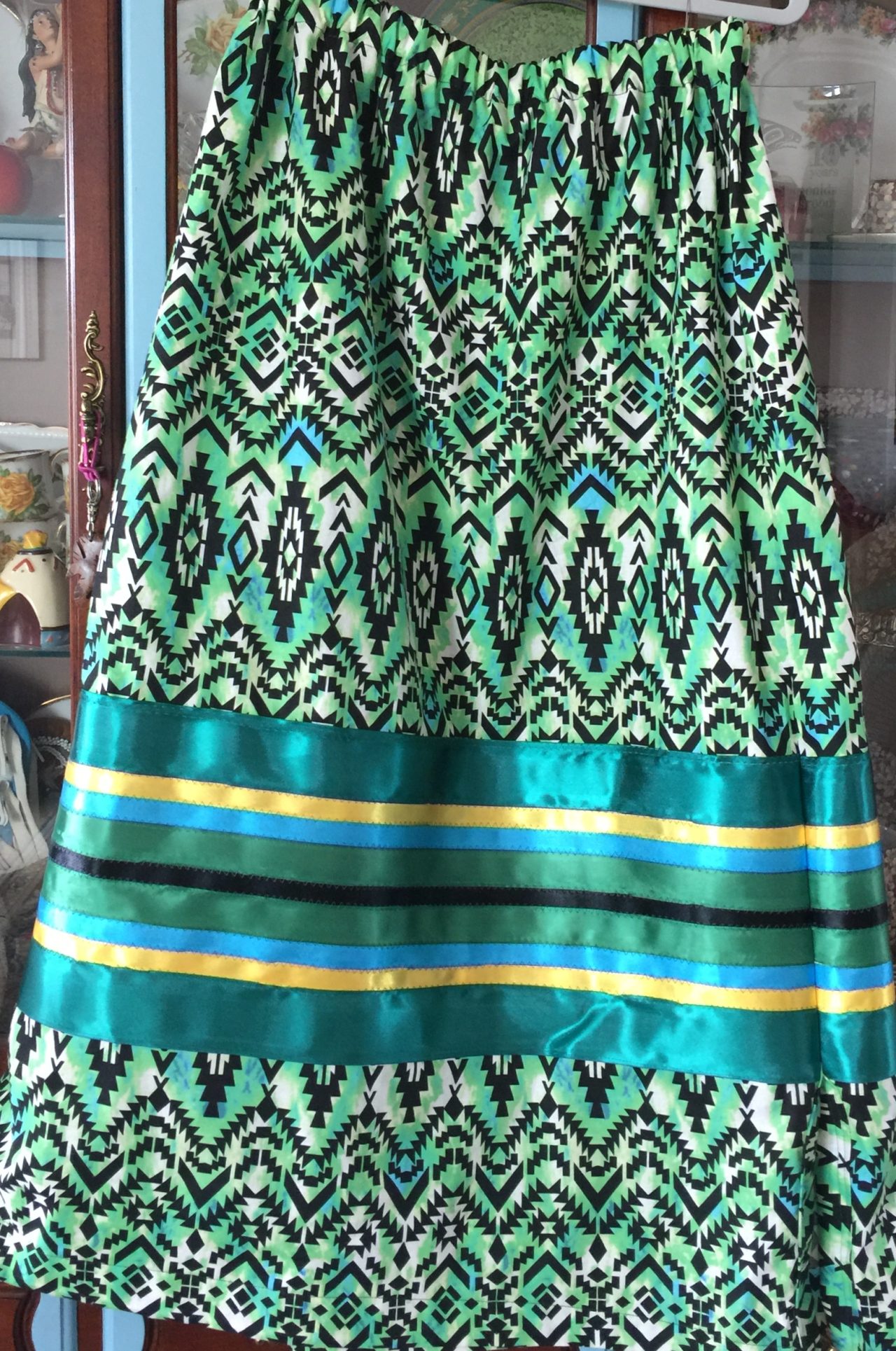
Join artist and educator Kim Soo Goodtrack and learn about the practice of making Ribbon Skirts. In conjunction with the exhibition, Beginning with the Seventies: Collective Acts, these workshops are part of a new collaborative installation by Dana Claxton and Jeneen Frei Njootli titled, The Sew In (2018). This work of art considers the sharing of Indigenous cultural knowledge, care, connection, labour and pleasure as integral components to the process of making art.
[more] -
Event
28 Oct 2018, 11 am - 2 pm. One-day workshop.
Workshop: Ribbonizing a Shirt
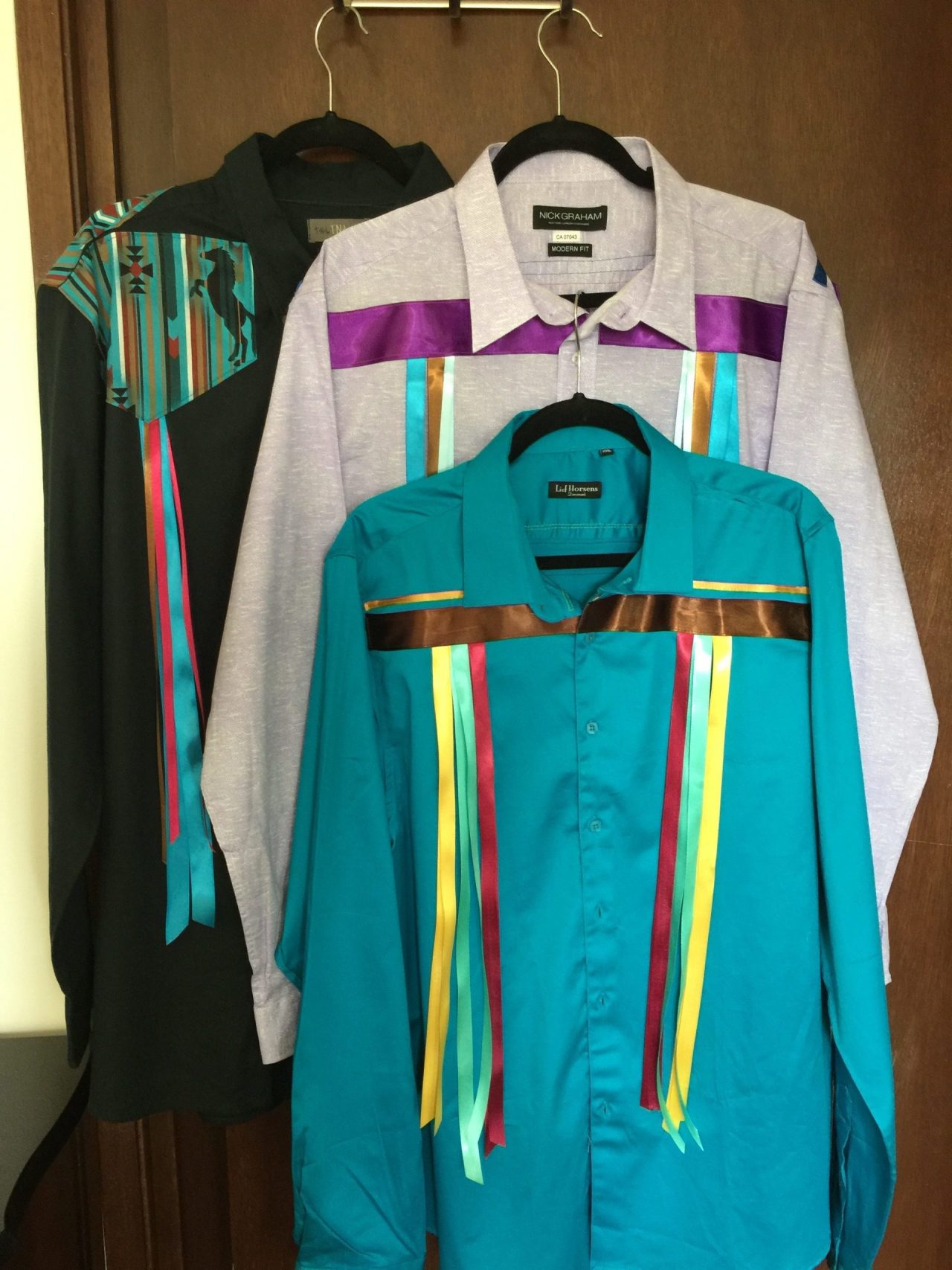
Join artist and educator Kim Soo Goodtrack and learn about the practice of making Ribbon Shirts. In conjunction with the exhibition, Beginning with the Seventies: Collective Acts, these workshops are part of a new collaborative installation by Dana Claxton and Jeneen Frei Njootli titled, The Sew In (2018). This work of art considers the sharing of Indigenous cultural knowledge, care, connection, labour and pleasure as integral components to the process of making art.
[more] -
News
28 Aug 2018
Call for Contributions to the Intuition Commons
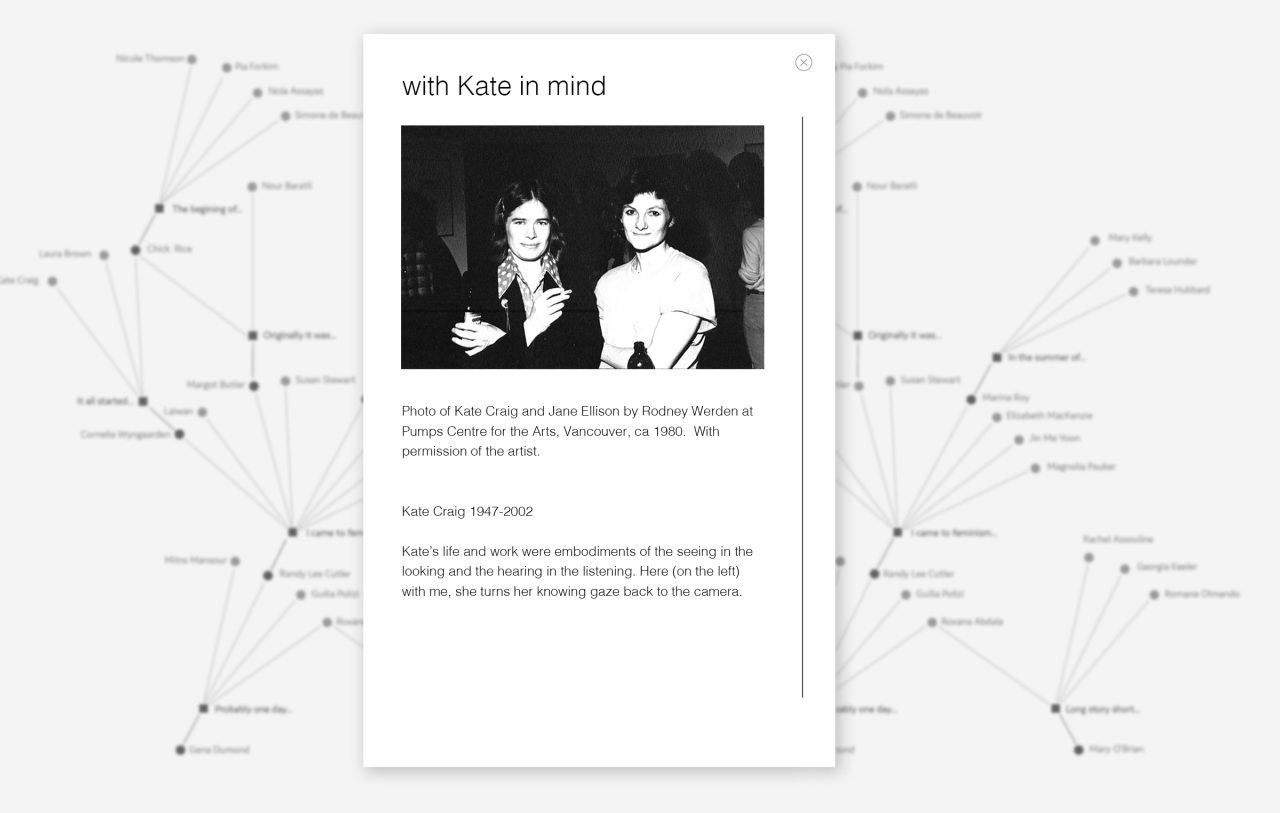
As part of Collective Acts, we invite you to visit the newly-launched Intuition Commons, a space that aims to facilitate an archive of female influences in creative practice that lie outside of conventional citations.
[more]